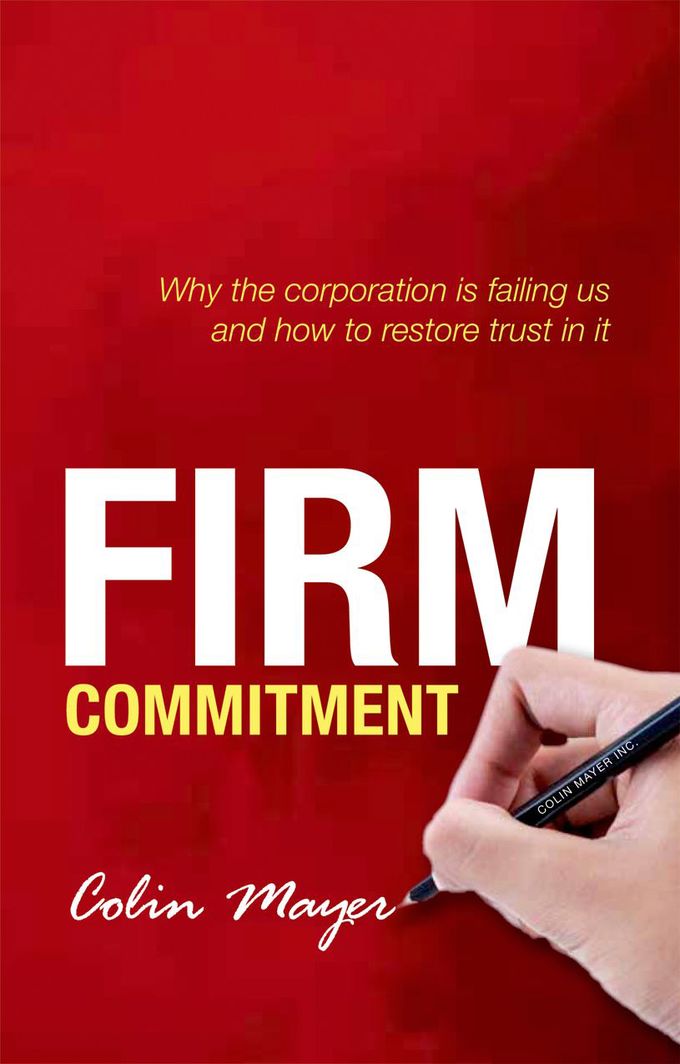Colin Mayer is Professor of Management Studies at the Saïd Business School in Oxford. He believes that “the corporation is failing us” and that dramatic changes in the rights and obligations of those who control corporations are needed. Firm Commitment explains why and makes proposals for change.
Mayer uses the term “corporation” to refer to the kind of limited company that is commonly used by large businesses. He recognises the huge benefits that corporations have brought but he considers them to be seriously flawed. Indeed, he describes his book as “both a tribute to and a condemnation of this remarkable institution that has created more prosperity and misery than could have ever been imagined”. He perceives the main problem to be that corporations are seen as the creatures of their shareholders, rather than as independent entities, and this leads to the pursuit of shareholder value over the interests of stakeholders other than shareholders. In support of this, he cites numerous well-known corporate scandals.
The primary focus of his book is the UK and Mayer appears to believe the position here is worse than elsewhere. However, he is not starry eyed about any currently available option. Notably, he recognises that family and other tightly owned companies may have their own problems and scandals (citing Parmalat) and, in any event, family ownership “is not the resolution to the 21st–century corporation’s problems”. He is also dismissive of the attempts that have been made in recent years to correct problems through regulation (which, he asserts, “promotes immoral conduct”) or through enhanced corporate governance (which, he suggests, may promote increased shareholder control to the further detriment of other stakeholders). He suggests that what we need is “to find mechanisms by which companies can demonstrate a greater degree of responsibility themselves without relying on others to do it for them”. Specifically, he suggests that “we need to establish the means by which corporations can demonstrate more commitment to their stakeholder community”.
Salvation is in what he calls “trust firms”, which would be like existing corporations subject to three adaptations: entrenched within their constitutions would be corporate values (which might reflect the values of their founders, public policy or other things); there would be trustee boards to act as custodians of these values; and the corporation would have “time dependent shares” whereby the voting rights of shareholders would depend upon the extent of their commitment to hold their shares for the longer term (e.g. a share which its holder is committed to hold for a further ten years would have ten times the voting rights of a share which the holder is only committed to hold for one more year).
Mayer does not want any compulsion to be applied in relation to this. He argues that diversity in corporate forms should be permitted. He does, however, suggest that there be tax incentives to encourage the use of trust firms.
There is a lot to applaud in this book. In particular, there is depressingly little evidence that increased regulation or the focus on corporate governance in recent years has materially improved the corporate world and, against this background, Mayer’s stress on the importance of “commitment” as opposed to “control” deserves serious consideration. It links with ideas derived from the work on “relational thinking” that has been undertaken in recent years by, amongst others, the Relationships Foundation and Tomorrow’s Company. Furthermore, the concept of a “trust firm” is an interesting one that could contribute to the development of a broader view of corporate purpose and responsibility.
Unfortunately, however, this is a flawed book. Perhaps Mayer has tried to cram too much into 250 pages. Whatever the reason, almost every page contains contentious statements or statements that require significant qualification. Although there are plenty of footnotes referring to past research, there are also many ex cathedra statements as well as many assertions and assumptions with which specialists will take issue. For example, some of the statements of law are, at best, partial and Mayer seems unaware that much of what he proposes can already be achieved through existing law (as, for example, the entrenchment of editorial independence within the constitution of The Economist Newspaper Ltd illustrates). He also accepts dubious interpretations of past events. In particular, his long description of the Cadbury takeover accepts the views of its former chairman, Sir Roger Carr, without examination. This is a pity because others involved in that takeover (including former Cadbury directors) have different views and consideration of these might have led to Mayer modifying some of his suggestions.
More seriously, Mayer’s analysis of the objective of corporations is unhelpful. He states that “shareholder value is an outcome not an objective” and even quotes former GE CEO Jack Welsh in support of his views. However, his argument only addresses the use of short term share prices as the test of shareholder value and his suggested alternative as a corporate objective is demonstrably inadequate. He asserts that a corporation’s “first and foremost objective is not to its shareholders, or to its stakeholders. It is to make, develop, and deliver things and to service people, communities, and nations”. It is unclear from where he derives this overarching normative assertion and, in any event, it is no more useful than saying that the objective of corporations is “to do things”! It does not help a corporation’s management to decide whether they should remain in heavy engineering or move to IT or whether to be a volume manufacturer or a niche player.
Finally, Mayer’s evident confidence that the trust firm does not suffer from serious flaws and is the solution to the myriad of issues that he has identified is not backed-up by careful analysis. He appears to recognise this since he says that his ideas need to be “subject to careful scrutiny”. They certainly do and, whilst they are undoubtedly worth such scrutiny, it may be seriously doubted whether they are the “cure all” that Mayer appears to believe.
That said, provided that the book is read critically, it is well worth reading.
“Firm Commitment” by Colin Mayer was first published in 2012 by Oxford University Press (ISBN-10: 0199669937).
Richard Godden is a Lawyer and has been a Partner with Linklaters for over 25 years during which time he has advised on a wide range of transactions and issues in various parts of the world.
Richard’s experience includes his time as Secretary at the UK Takeover Panel and a secondment to Linklaters’ Hong Kong office. He also served as Global Head of Client Sectors, responsible for Linklaters’ industry sector groups, and was a member of the Global Executive Committee.


